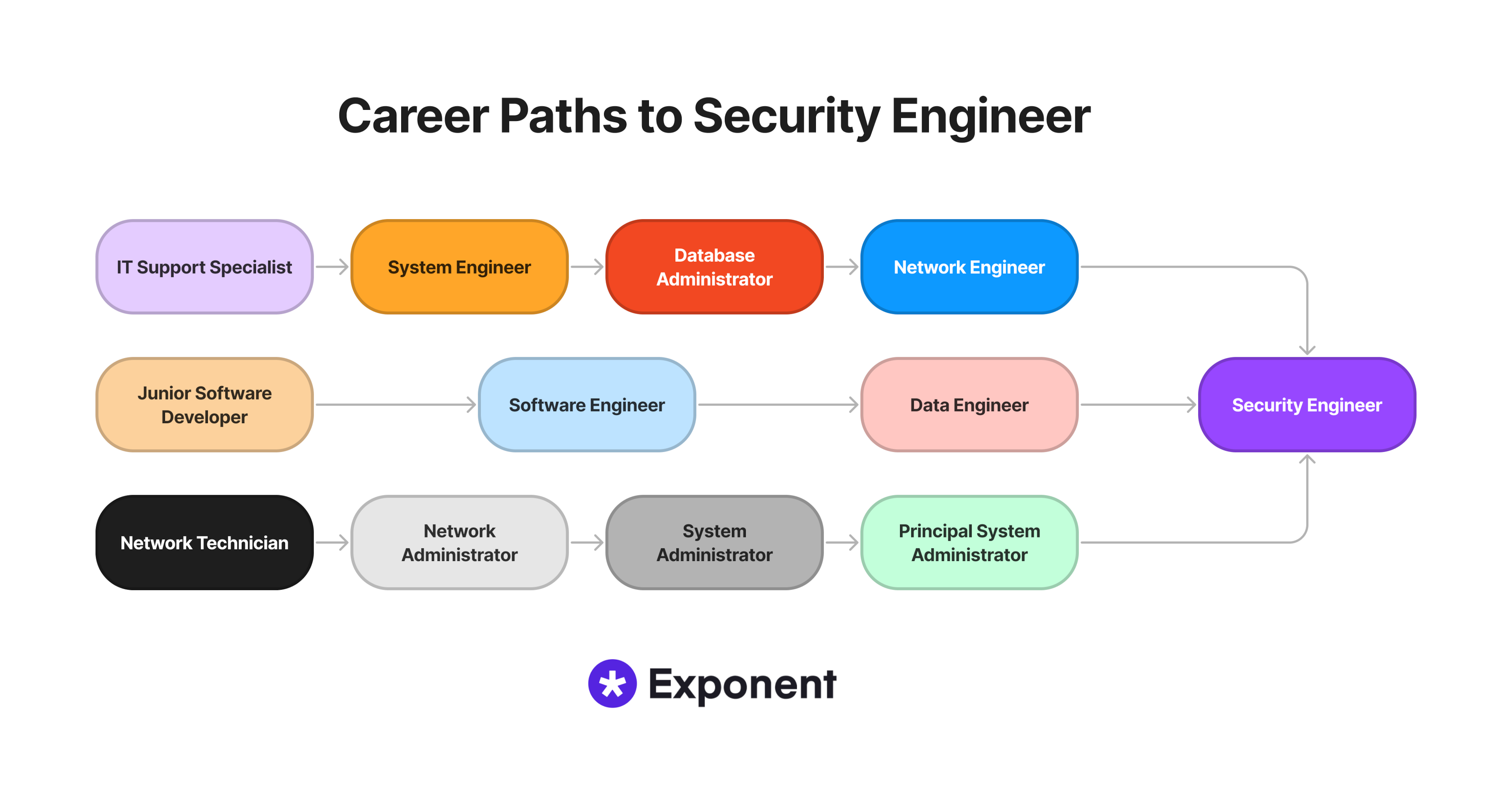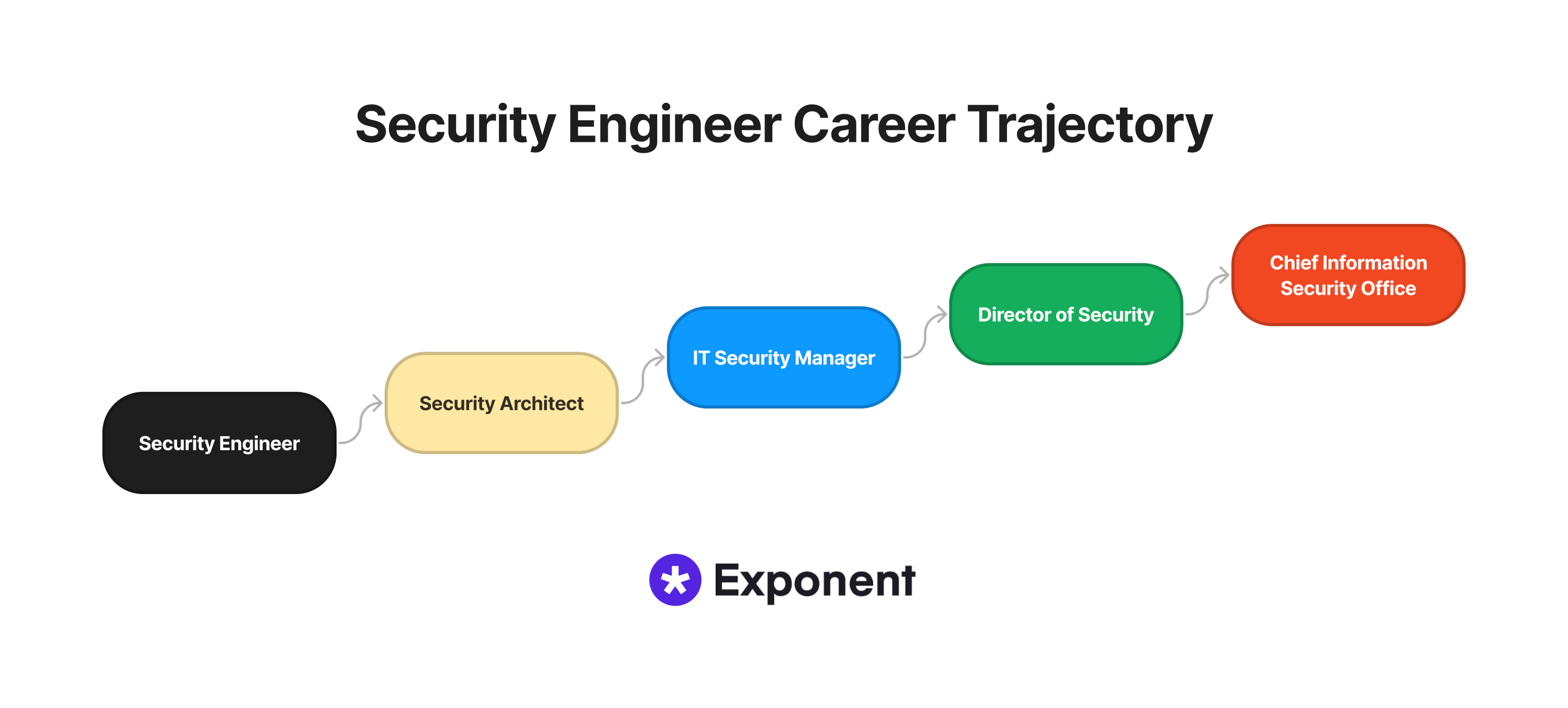The cybersecurity field is booming. It is currently one of the most in-demand tech positions. This is not only because of the importance of the discipline but because the supply of qualified security engineers is too little.
This ultimately means it is a perfect time to jump into the security engineer role if you're interested in information technology security.
Security engineers can enjoy high salaries, tremendous job security (pun intended), strong career trajectories, and exciting responsibilities.
If you have a background in engineering or network security, this position may be perfect. To help you learn more, we wrote up this definitive guide to the security engineer role.
In this article, you'll learn:
- What Is a Security Engineer?
- What Does a Security Engineer Do?
- What Are the Top Security Engineer Skills?
- What Is the Difference Between a Security Engineer and a Security Analyst?
- How to Become a Security Engineer
- The Average Salary of Security Engineers
- The Security Engineer Career Path
- The Top Cyber Security Certifications
What Is A Security Engineer?

The internet is a fantastic thing. Only a few times in history has there ever been a technological innovation that revolutionized virtually every aspect of human life as the internet has.
Nowadays, human beings depend on the internet for nearly everything. However, this reliance on the internet and computers brings severe risks and security threats if these systems are not secured.
These risks are exacerbated by the growth and expanded use of "smart" devices and the Internet of Things, such as Smart TVs, Smart Fridges, etc.
But that's where Security Engineers come in.
Security engineering (or cybersecurity engineering) is the discipline of engineering focused on developing secure technical systems. Security engineering is also focused on designing systems resilient to other potential causes of outages, such as natural disasters.
Hackers and other nefarious agents are always poking holes in networks, looking for any possible exploit they can use to their advantage. These cyber-attacks can come in many different forms, such as phishing, malware, ransomware, DDoS attacks, etc.
It is the job of security engineers to prevent these attacks from being successful.
What Does a Security Engineer Do?

The cybersecurity profession is a broad one. Security engineers, as a result, will likely have many different job duties in their roles.
The exact duties will also differ depending on what kind of company they are working at. For instance, a FinTech company will undoubtedly have different security needs from a social media platform.
No matter what, though, as we mentioned, security engineers develop security tools, security protocols and systems and keep computer networks secure and running.

Complete Software Engineering Interview Prep Course
Our software engineering interview course helps you review the most important data structures, algorithms, and system design principles, with detailed questions and mock interviews.
This kind of engineering could entail developing and testing security features, implementing security controls, monitoring network traffic, troubleshooting problems, thwarting cybersecurity threats, etc.
All information security engineers must stay ahead of the information security field. As you can imagine, hackers and cybercriminals are always learning new tricks or finding new exploits. If a security engineer doesn't stay on top of these threats, their success in the roles will suffer.
The Security Engineer Job Responsibilities
The individual job responsibilities of security engineers may differ depending on where they work and the size of their organizations. Nevertheless, if you're looking at security engineer job listings, you'll likely see job descriptions like this:
- Help protect network boundaries, keep computer systems and network devices hardened against attacks and provide security services to defend susceptible data like passwords and customer information,
- Work hands-on with network equipment and actively monitor security controls for attacks and intrusions,
- Work with software engineers and security team to proactively identify and fix security flaws and vulnerabilities,
- Work with Engineers and Product Managers to navigate challenging online safety situations and handle abuse and fraud,
- Conduct investigations to identify new harmful behaviors, enforce product policies, and analyze distribution trends,
- Collaborate with cross-functional groups such as Engineering, Policy, and Legal to update policies, fix product loopholes, and provide users with a better user experience.
What Are The Security Engineer Job Qualifications?
In most cases, hiring managers will want security engineering candidates with at least a bachelor's degree in computer science, engineering, or another technical field.
Beyond that, security engineers may be expected to have some of the following qualifications:
- Knowledge of security protocols, methods and procedures,
- Experience in vulnerability testing and code-level security auditing,
- The capability to assess the security ramifications of system changes,
- Up-to-date understanding of recent cybersecurity trends, especially emerging threats or innovative hacking techniques,
- Command of programming languages such as Java, Python Net, C++, and others,
- The ability to read assembly and read obfuscated code,
- The ability to reverse engineer software systems,
- Experience with static and dynamic analysis of malicious binaries.
- The ability to collaborate with cross-functional teams.
What Are the Top Security Engineer Skills?

Considering these various job duties expected of security engineers, they must have several different technical and soft skills. The most important of which are:
Security Engineer Technical Skills
Coding/Programming
Security engineers will be required to write code. Therefore, they must be proficient in Java, Javascript, C++, Python, Ruby, or others.
Computer Networking
Given how much cybersecurity, as a field, has to do with network security, security engineers will certainly need extensive networking skills. Most of an organization's vulnerabilities and security threats lie in its network, after all.
Security engineering requires routing protocols, encryption, firewalls, and virtual private networks (VPNs).
Penetration Testing
Security engineers will need to think like hackers when securing a company's computer systems. For example, suppose potential vulnerabilities of exploits exist in a computer system. In that case, a security engineer will need to find them before anyone else does.
They can do so with penetration testing, also known as "ethical hacking." This involves a simulated cyber-attack by the security engineer to test a system's security and integrity.
Knowledge of Operating Systems
Security engineers will likely be tasked with securing computer systems running on several different operating systems. Therefore, they will need experience and knowledge of operating systems such as Windows, MacOS, or Linux.
Computer Hacking Techniques
As we've mentioned, cybersecurity is a rapidly evolving field. Likewise, as computing technologies themselves evolve, so do their potential vulnerabilities and security threats.
Security engineers must keep up with the latest trends in cybersecurity, security tools and the newest hacking techniques.
Intrusion Detection
Security engineers will likely work alongside security analysts to monitor network activity on an Intrusion Detection System or IDS. Therefore, they must have intrusion detection and prevention skills for success in their roles.
Working With Databases
Often, when a hacker attempts to infiltrate or exploit a network, they're after the system's data. Whether that means passwords or credit card numbers, most companies are sitting on large amounts of valuable and sensitive data they need to protect.
Therefore, security engineers need to have experience with working with databases and large data sets if they are to protect them adequately.
Security Engineer Soft Skills
While security engineering is undoubtedly a very technical role, security engineers still need several soft skills for their day-to-day responsibilities.
Specifically, they need communication and cross-functional collaboration skills. Security engineers will rarely work along and will likely be part of a larger security team.
Security engineers will also need to be able to communicate with other stakeholders about security concerns, findings, or recommendations. Along these lines, they will need to share what are often complex cybersecurity details with both technical and non-technical stakeholders.
What Is The Difference Between A Security Engineer and A Security Analyst?

You may find two similar roles within the security team at some companies. This is, of course, a security engineer and security analyst.
Despite the similarity of the titles, these are distinct positions that come with different responsibilities.
Cybersecurity engineers are responsible for always investigating how nefarious actors can infiltrate an organization's networks and systems.
On the other hand, security analysts must work alongside other stakeholders at the company to assess and evaluate the cybersecurity needs and shortcomings within an organization's systems and networks.
How to Become a Security Engineer

First and foremost, if you want to become a security engineer, you'll need to first develop knowledge of and gain experience in computer science and network security, primarily.
Given how vital cybersecurity is for organizations, the level of knowledge necessary for the role will likely take years to acquire.

Don't feel discouraged if you can't find a security engineer position early in your engineering career. It typically takes years for software engineer to work their way up.
However, to do so, you'll need to follow these steps:
Earn a Bachelor's Degree
Unlike some other tech roles, hiring managers may require cybersecurity candidates to have a bachelor's degree. These degrees could be computer science, cybersecurity, engineering, or information technology.
Nevertheless, it is still possible to become a security engineer without a technical degree if you have extensive practical experience.
Not only that, in many cases, security engineers enter their roles after having worked as software engineers for several years. So, don't sweat it too much if you're currently an engineer without a degree.
Gain Experience with Information Technology
Now, this step is a must. You cannot become a security engineer without gaining extensive experience with information technology.
While it's true that many security engineers were once software engineers, many others start their careers from entry-level IT positions.
Some cybersecurity professionals work their way up from database administrators, systems administrators, IT support reps, or network engineers.
It's not uncommon for these individuals to work for several years in these positions, gaining the necessary experience.
If you want to become an information security engineer, we recommend that you first get one of these or other IT jobs if you have not already.
Study up on Security Engineer Interview Questions
Ultimately, you won't be able to become a security engineer if you first cannot ace your upcoming interviews. So here at Exponent, we've collected hundreds of questions asked during interviews at some of the biggest tech companies today.

Complete System Design Interview Prep Course
Learn how to answer system design questions with in-depth video examples and fundamental concepts.
Here are some asked during security engineering interviews:
- How would you approach reducing security vulnerability resolution times across software products? Watch our answer here.
- Explain the difference between symmetric and asymmetric encryption. Check out our guide to encryption here.
- Can you tell me the difference between hashing, encryption, and encoding?
- How can you protect against specific cybersecurity attacks, such as DDoS or man-in-the-middle?
- Tell me about a time you solved a challenging security problem and how you resolved it.
- What sort of anomalies would you look for to identify a compromised system?
- How do you approach penetration testing? What tools do you typically use?
- How would you consider threat modeling, given a specific scenario?
- Describe what happens when you type www.tryexponent.com into your browser.
- How would you catch a DDOS attack?
The Average Security Engineer Salary

According to Glassdoor, as of May 2022, the average salary of a security engineer in the US is $113,484. However, this salary can range depending on the organization's location, level of experience, and the kind of company you are working for.
Security engineers could receive salaries as low as $49,000/year or as high as $265,000.
Thanks to our friends at Levels.fyi, we know how much security engineers at the various big tech companies are generally paid:
Amazon: A L4 Software Engineer specializing in Security Engineering at Amazon, on average, makes around $210,000/year in total compensation after working at the company for approximately three years.
Apple: A ICT4 Security Engineer at Apple makes around $365,000/year in total compensation after working at the company for approximately three years.
Microsoft: A L62 Security Engineer at Microsoft makes around $234,000/year in total compensation after working at the company for approximately five years.
Netflix: A Senior Software Engineer (Security) at Netflix makes around $640,000/year in total compensation after working at the company for approximately four years.
Coinbase: A IC5 Security Engineer at Coinbase makes around $381,000/year in total compensation after working at the company for approximately one year.
Slack: A Senior Engineer (Security) at Slack makes around $415,000/year in total compensation after working at the company for approximately three years.
The Security Engineer Career Path
Most security engineers begin their careers either working in entry-level IT positions or as junior software engineers. However, there are several potential starts to the security engineer career path, as you can see below:

After you've become a security engineer, there are many possible trajectories your career could take. The most straightforward, however, is moving up into management.

After a couple years in the engineer role, you could advance into the security architect position. From there, it's a straight shot into a manager's job, which could lead to executive-level security positions such as Director of Security or even Chief Information Officer.
The Job Market for Security Engineers
Currently, the market for security engineering jobs is strong. Talented cybersecurity professionals are in high demand, given the stakes and the lack of qualified candidates.
The US Bureau of Labor Statistics reports that the cybersecurity field will grow by over 30% in the next ten years. This is significantly faster than the average career.
The Top Cyber Security Certifications

Because cybersecurity and the threats facing organizations are constantly evolving, it's a good idea to obtain a certification in the field.
As mentioned in the previous section regarding the role's qualifications, security engineers must stay on top of the latest and greatest hacking techniques. Some companies may require their security engineers to be certified and renew their certifications regularly.
At the very least, these certifications will make your candidacy very attractive to potential employers.
Nevertheless, there are several different certifications for the various stages of your security engineer career.
For instance, one of the most prestigious security certifications, CISSP, requires engineers to already have several years of experience and cybersecurity knowledge.
Suppose you're newer to the cybersecurity field. In that case, we recommend you start with certifications such as CompTIA Security+ or GIAC Security Essentials Certification (GSEC).
Later in your cybersecurity career, you could attempt certifications such as Systems Security Certified Practitioner (SSCP), CompTIA PenTest+, or Certified Information Systems Auditor (CISA).
More Resources
Ultimately, the best way to prepare for the security engineer interview is to get out there and practice. Here are some resources that could be helpful in your preparation:
👯♂️ Practice your behavioral and system design skills with our interview practice tool.
👨🎓 Take our complete System Design interview course.
🖊️ Software engineering interview cheat sheet
Good luck with your interview preparation journey!
Your Exponent membership awaits.
Exponent is the fastest-growing tech interview prep platform. Get free interview guides, insider tips, and courses.
Create your free accountRelated Blog Posts
How to Prepare for a Security Engineer Interview



